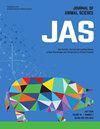Acute enhanced liquid aspirin administration improves performance and intestinal function in nursery pigs
IF 2.7
2区 农林科学
Q1 AGRICULTURE, DAIRY & ANIMAL SCIENCE
引用次数: 0
Abstract
Aspirin (acetylsalicylic acid) is a nonsteroidal anti-inflammatory drug which has been a widely used analgesic for pain relief as well as an anti-inflammatory medication. However, it also causes negative effects to the gastrointestinal (GI) tract including GI bleeding, peptic ulcers, and can also impact the small intestine. Enhanced liquid aspirin (ELA) contains a combination of a salicylate compound, glycerin, triacetate, and saccharin which is more stable than aspirin alone and may reduce negative effects on the GI tract, while still exerting positive effects on inflammatory processes. The objective of this pilot study was to evaluate oral ELA on healthy weaning pigs. 8 pigs per treatment were gavaged daily for 5 d with either saline controls (CON) or 2 mg/kg body weight ELA. After the 5-d dosing period, pigs were weighed and then euthanized for intestinal sample collection. ELA-administered pigs gained significantly more body weight relative to initial body weights compared to CON pigs (8% vs. 13.7%; P<0.05). Additionally, there was tendency for an increase of 24% in villus height in ELA pigs compared to CON (P = 0.06) and significant increases in relative protein expression of Claudins (CLDN) 3 and 7 (P<0.05). Finally, several genes were altered in ELA-fed pigs compared to CON including stem cell markers and immune markers. All in all, this data showed that ELA was well tolerated in a pig model, showed a preliminary improvement in body weight, and had no observable negative impacts.求助全文
约1分钟内获得全文
求助全文
来源期刊

Journal of animal science
农林科学-奶制品与动物科学
CiteScore
4.80
自引率
12.10%
发文量
1589
审稿时长
3 months
期刊介绍:
The Journal of Animal Science (JAS) is the premier journal for animal science and serves as the leading source of new knowledge and perspective in this area. JAS publishes more than 500 fully reviewed research articles, invited reviews, technical notes, and letters to the editor each year.
Articles published in JAS encompass a broad range of research topics in animal production and fundamental aspects of genetics, nutrition, physiology, and preparation and utilization of animal products. Articles typically report research with beef cattle, companion animals, goats, horses, pigs, and sheep; however, studies involving other farm animals, aquatic and wildlife species, and laboratory animal species that address fundamental questions related to livestock and companion animal biology will be considered for publication.
 求助内容:
求助内容: 应助结果提醒方式:
应助结果提醒方式:


